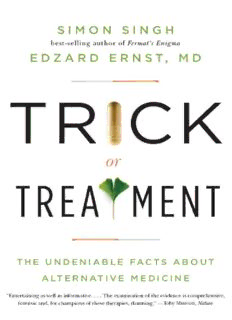
Trick or treatment: the undeniable facts about alternative medicine PDF
Preview Trick or treatment: the undeniable facts about alternative medicine
Trick or Treatment Trick or Treatment The Undeniable Facts About Alternative Medicine Simon Singh & Edzard Ernst, MD W. W. NORTON & COMPANY New York • London Copyright © 2008 by Simon Singh and Edzard Ernst First published in Great Britain in 2008 by Bantam Press, an imprint of Transworld Publishers, under the title Trick or Treatment? Alternative Medicine on Trial All rights reserved For information about permission to reproduce selections from this book, write to Permissions, W. W. Norton & Company, Inc., 500 Fifth Avenue, New York, NY 10110 Production manager: Anna Oler Library of Congress Cataloging-in-Publication Data Singh, Simon. Trick or treatment: the undeniable facts about alternative medicine/ Simon Singh & Edzard Ernst.—1st American ed. p. cm. Includes bibliographical references. ISBN: 978-0-393-06986-0 1. Alternative medicine. I. Ernst, E. (Edzard) II. Title. [DNLM: 1. Complementary Therapies. 2. Evidence-Based Medicine. 3. Placebo Effect. WB 890 S617t 2008] R&33.S568 2008 610—dc22 2008019110 W. W. Norton & Company, Inc. 500 Fifth Avenue, New York, N.Y. 10110 www.wwnorton.com W. W. Norton & Company Ltd. Castle House, 75/76 Wells Street, London W1T 3QT 2 3 4 5 6 7 8 9 0 Dedicated to HRH The Prince of Wales Contents Introduction 1 How Do You Determine the Truth? 2 The Truth About Acupuncture 3 The Truth About Homeopathy 4 The Truth About Chiropractic Therapy 5 The Truth About Herbal Medicine 6 Does the Truth Matter? Appendix: Rapid Guide to Alternative Therapies Further Reading Acknowledgements Picture Credits Introduction T HE CONTENTS OF THIS BOOK ARE GUIDED ENTIRELY BY A SINGLE PITHY sentence, written over 2,000 years ago by Hippocrates of Cos. Recognized as the father of medicine, he stated: ‘There are, in fact, two things, science and opinion; the former begets knowledge, the latter ignorance.’ If somebody proposed a new medical treatment, then Hippocrates declared that we should use science to decide whether or not it works, rather than relying on somebody’s opinion. Science employs experiments, observations, trials, argument and discussion in order to arrive at an objective consensus on the truth. Even when a conclusion has been decided, science still probes and prods its own proclamations just in case it has made a mistake. In contrast, opinions are subjective and conflicting, and whoever has the most persuasive PR campaign has the best chance of promoting their opinion, regardless of whether they are right or wrong. Guided by Hippocrates’ dictum, this book takes a scientific look at the current plethora of alternative treatments that are rapidly growing in popularity. These treatments are piled high in every pharmacy, written about in every magazine, discussed on millions of web pages and used by billions of people, yet they are regarded with scepticism by many doctors. Indeed, our definition of an alternative medicine is any therapy that is not accepted by the majority of mainstream doctors, and typically this also means that these alternative therapies have mechanisms that lie outside the current understanding of modern medicine. In the language of science, alternative therapies are said to be biologically implausible. Nowadays it is common to hear the umbrella term ‘complementary and alternative medicine’, which correctly implies that sometimes these therapies are used alongside and sometimes instead of conventional medicine. Unfortunately it is a lengthy and clumsy phrase, so in a bid for simplicity we have decided to use the term ‘alternative medicine’ throughout this book. Surveys show that in many countries over half the population use alternative medicine in one form or another. Indeed, it is estimated that the annual global spend on all alternative medicines is in the region of £40 billion, making it the fastest-growing area of medical spending. So who is right: the critic who thinks alternative medicine is akin to voodoo, or the mother who entrusts her child’s health to alternative medicine? There are three possible answers. 1. Perhaps alternative medicine is entirely useless. Perhaps persuasive marketing has fooled us into believing that alternative medicine works. Alternative therapists might seem like nice people, talking as they do about such appealing concepts as ‘nature’s wonders’ and ‘ancient wisdom’, but they might be misleading the public – or maybe they are even deluding themselves. They also use impressive buzzwords like holistic, meridians, self-healing and individualized. If we could see past the jargon, then would we realize that alternative medicine is just a scam? 2. Or maybe alternative medicine is overwhelmingly effective. Perhaps the sceptics, including many doctors, have simply failed to recognize the benefits of a more holistic, natural, traditional and spiritual approach to health. Medicine has never claimed to have all the answers, and over and over again there have been revolutions in our understanding of the human body. So will the next revolution lead to a discovery of the mechanisms underlying alternative medicine? Or could there be darker forces at work? Could it be that the medical establishment wants to maintain its power and authority, and that doctors criticize alternative medicine in order to quash any rivals? Or might these self-same sceptics be puppets of the big pharmaceutical corporations who merely want to hold on to their profits? 3. Or does the truth lie somewhere in the middle? Whatever the answer, we decided to write this book in order to get to the truth. Although there are already plenty of books that claim to tell you the truth about alternative medicine, we are confident that ours offers an unparalleled level of rigour, authority and independence. We are both trained scientists, so we will examine the various alternative therapies in a scrupulous manner. Moreover, neither of us has ever been employed by a pharmaceutical company, and nor have we ever personally profited from the ‘natural health’ sector – we can honestly say that our only motive is to get to the truth.
Description: